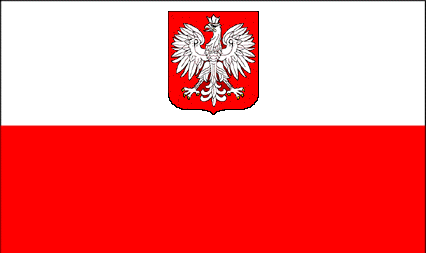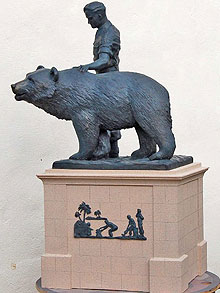
Dedicated to Polish Arts and Culture Since 1946
Welcome - Witamy!

|
Polish Arts Club of Trenton, New Jersey
Dedicated to Polish Arts and Culture Since 1946 Welcome - Witamy! |
|
Polish bear 'that fought Nazis' to be commemorated |
||
Bear who is said to have helped Polish troops battle invading Germans is to be commemorated with a statue in Edinburgh - the city where he 'retired' after the Second World War. The
£200,000 monument is to commemorate the extraordinary life of "Private Wojtek", a 6ft tall, 500lb brown bear who served alongside Polish soldiers -- and lived out his years after the war in Edinburgh Zoo.
Monument to Private Wojtek, a 6ft tall, 500lb brown bear
The
£200,000 monument is to commemorate the extraordinary life of "Private Wojtek", a 6ft tall, 500lb brown bear who served alongside Polish soldiers -- and lived out his years after the war in Edinburgh Zoo.
Monument to Private Wojtek, a 6ft tall, 500lb brown bear
A maquette of the planned work, by Scottish sculptor Alan Herriot, shows Wojtek's 'keeper', soldier Peter Prendys, placing a hand on the shoulder of the gentle giant, a stance he always adopted when the pair walked around camp together. Wojtek -- a Polish boys name which means the "happy warrior" -- was acquired by the Polish Army as a cub, and quickly took on the role of mascot to the 22nd Company of Polish Army Corps. He provided a "welcome distraction" from the horrors of the desert war, wrestling with the troops and entertaining them by getting into countless scrapes, from getting stuck up a palm tree to cornering an Arab spy. He is best remembered however for his role in the brutal battle of Monte Cassino in 1944, where he voluntarily helped his comrades unload boxes of artillery shells for the Allied guns under fire. When the war finished, Wojtek and his company were relocated to Winfield camp near Hutton in Berwickshire before the bear was moved to Edinburgh Zoo in 1947, where he lived out his final years. It is the bear's relationship with his comrades which is portrayed in Herriot's sculpture -- as opposed to the famous image of him carrying a mortar shell in his paws. Mr Herriot said on Wednesday: "Wojtek may be most famous for assisting his fellow soldiers in carrying the shells, but really the value was in the effect his presence had on morale. "I was very keen to depict that close friendship they enjoyed with him, as well as the entertainment and laughter he brought to the troops. "We are also talking to people about raising a similar statue in Warshau and Monte Cassino. "It's not just about the bear, it is also to commemorate the part the Polish played in the Second world War. "The British and other European countries owe a great deal to them." Several sites in the capital are considered for the monument, including Hillside Crescent and Calton Hill. When this is decided, an application for permission will be submitted to Edinburgh City Council, with the intention that the statue will be unveiled in around 12 months' time. The campaign to erect the memorial is backed by Cardinal Keith O'Brien -- most of the Polish soldiers were Catholic -- together with Euan Loudon, the former governor of Edinburgh Castle and Aileen Orr, author of the book Wojtek the Bear: Polish War Hero. She said she had been captivated by his story ever since she visited him at Edinburgh Zoo, aged eight, with a Polish friend. When Wojtek heard her friend speaking Polish his ears pricked up and he waved to the two delighted school girls. In addition, Ms Orr's grandfather, who had met the bear on a number of occasions during the war, told her stories about him when she was a child. Ms Orr, from Lockerbie, said: "Like many men, my grandfather didn't like to talk about the war. "But he was able to talk about about it a bit by telling me about Wojtek. He met the bear while he was serving in Palestine and Egypt and it made a great impression on him. "What the bear offered all of these men was comfort. At a time when they were far from home, had nothing, and often no-one, Wojtek stood in for the wives, children, pets, family they'd left behind. He was someone to live love and someone who loved them back." Edinburgh's Lord Provost George Grubb said: "Wojtek, the Soldier Bear, was a very familiar and much-cherished figure in Edinburgh and became part of the tradition and history of the Polish community in the city. "We would like to ensure that his memory is preserved for generations to come and our monuments experts are currently working with the Polish community to help identify a suitably prominent site for his memorial statue." |